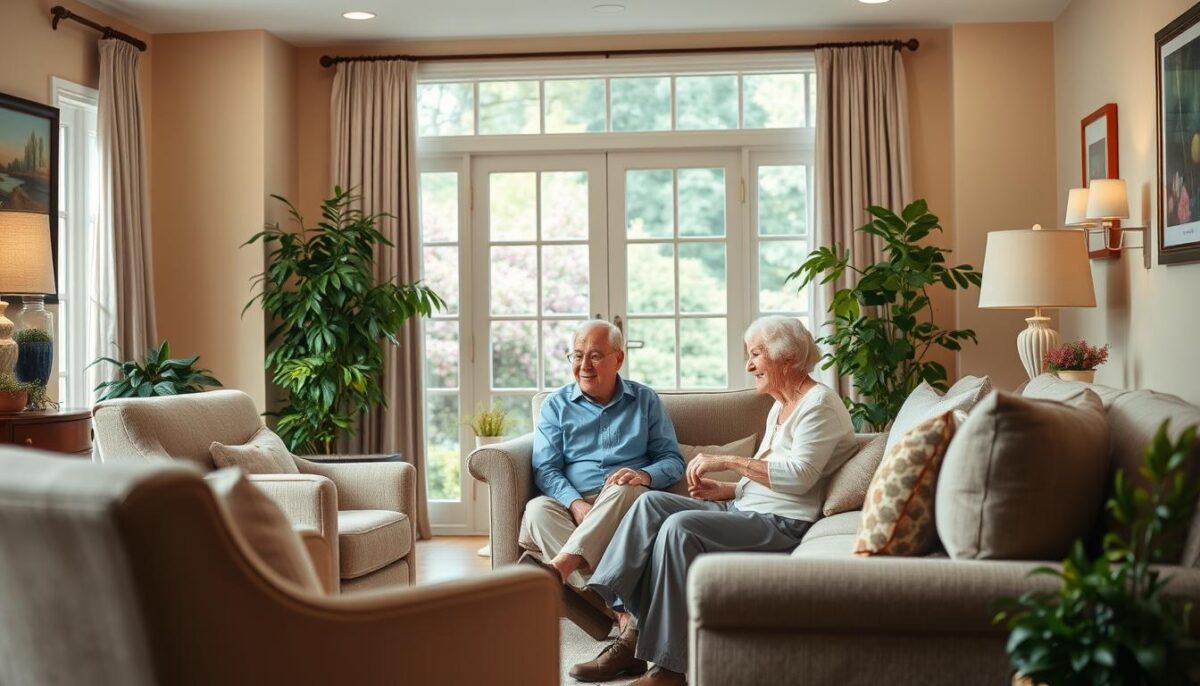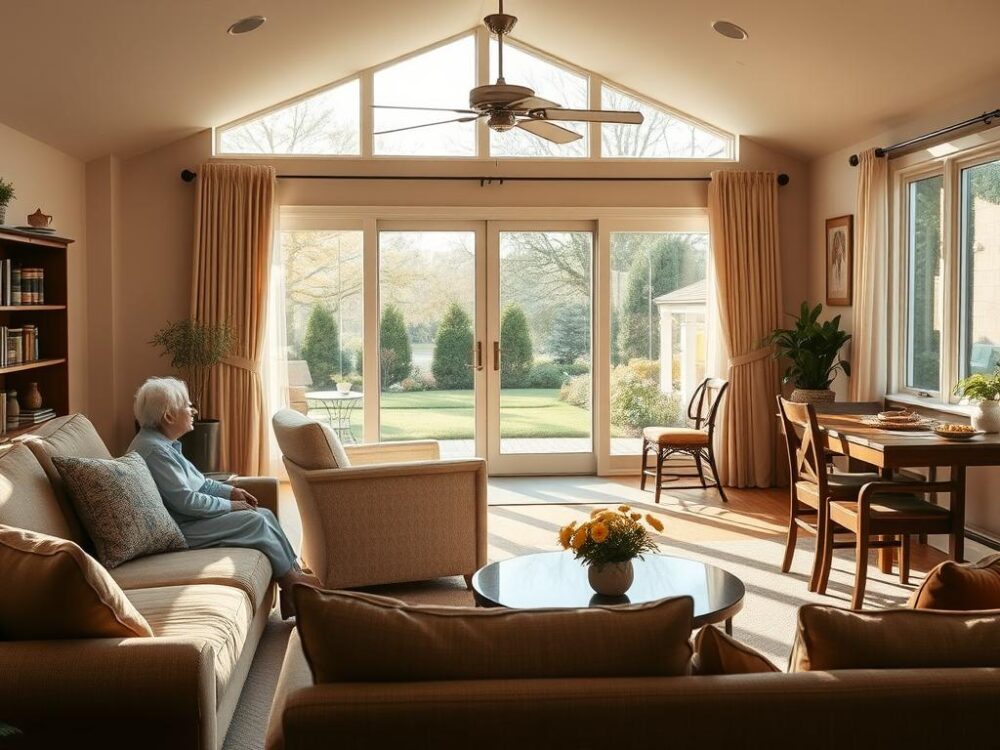
Trusted Home Health Care in Philadelphia
October 24, 2024
Exceptional Home Care services Framingham MA
April 8, 2025Elderly care services Framingham MA: Maintaining independence while aging often requires thoughtful solutions. Many families in Massachusetts seek tailored assistance that preserves dignity and adapts to evolving needs. Recent studies show 90% of older adults prefer staying in familiar environments rather than relocating.
Specialized support teams provide services from daily task assistance to meaningful companionship. These professionals focus on developing customized plans that cater to individual preferences and health needs. Whether medication reminders or engaging activities, services are designed to adapt as circumstances change.
Leading organizations like Home Instead® prioritize safety while fostering social connections. Their approach merges practical help with emotional support, enabling individuals to flourish in their environments. This balance reassures families that their loved ones receive respectful and attentive care.
Key Takeaways
- Most older adults prioritize remaining in their homes as they age
- Customizable plans address both physical needs and emotional well-being
- Trained professionals provide safety monitoring and daily living support
- Companionship services combat isolation while maintaining routines
- Local providers offer flexible solutions for different care requirements
Understanding Home-Based Senior Care
Staying in familiar surroundings as we age offers comfort and stability. For many, this means prioritizing home care services that adapt to changing needs while preserving daily rhythms. Research shows 78% of older adults report better emotional health when receiving support in their own spaces.

The Benefits of Aging in Place
Remaining at home allows individuals to maintain cherished routines and connections. Personalized in-home care plans address everything from meal preparation to mobility support. This approach reduces stress caused by relocation and empowers people to direct their daily lives.
Companionship plays a vital role in combating loneliness. Trained professionals provide conversation and engagement alongside practical help. Studies link regular social interaction to improved cognitive function and longer lifespans.
How In-Home Care Enhances Quality of Life
Skilled caregivers blend health monitoring with respect for personal preferences. They assist with medication management while encouraging hobbies and family interactions. This balance supports physical safety and emotional fulfillment.
Flexible schedules mean support evolves as needs change. Whether requiring occasional help or full-time assistance, tailored solutions prioritize dignity. Families gain reassurance knowing their loved ones receive attentive, individualized care.
Elderly Care Services framingham ma: Comprehensive Support Options
Quality support systems empower individuals to thrive in their preferred environments. Local programs combine practical personal care with enriching companionship, creating holistic solutions for diverse needs. Providers like Home Instead® and Advanced Home Care deliver adaptable plans that evolve with changing circumstances.

Daily Living Support and Social Connection
Skilled aides assist with bathing, grooming, and mobility while preserving independence. Meal preparation and medication management ensure safety without sacrificing routines. Companionship activities like shared hobbies or outings reduce family stress and promote mental wellness.
Specialized Care for Complex Needs
Round-the-clock teams provide emergency response and overnight monitoring for peace of mind. Hospice-trained professionals focus on comfort through pain management and emotional support during challenging transitions. Dementia specialists use proven techniques to maintain cognitive engagement while ensuring safety.
Testimonials highlight how 24-hour home care prevents hospital readmissions through consistent monitoring. One client’s family shared: “The caregivers became trusted partners in managing Mom’s Parkinson’s symptoms.” These services adapt seamlessly to evolving health conditions while prioritizing dignity.
Choosing Trusted Providers for Your Loved One
Finding reliable home care requires verifying both expertise and compassion. Reputable agencies prioritize rigorous screening, including background checks and skills assessments. Susan P. shares: “Knowing our caregiver passed multiple interviews gave us instant confidence in their abilities.”
Screened and Expert Caregivers
Top providers require certifications in CPR, dementia care, and emergency response. Ann G. notes: “When Mom fell, her aide administered first aid while coordinating with doctors seamlessly.” Specialized training ensures caregivers effectively handle medication routines, mobility challenges, and cognitive conditions.
Continuous education keeps teams updated on best practices. Look for agencies offering ongoing workshops on topics like Parkinson’s management or diabetic care. This expertise prevents crises and maintains health stability.
Building a Supportive Care Team for Family Peace of Mind
Consistent communication bridges families and caregivers. Irina K. explains: “Daily updates via their app showed exactly how Dad spent his day.” Transparent reporting builds trust while allowing adjustments to care plans.
Dedicated coordinators match caregivers to specific personalities and needs. One client’s son remarked: “Their team learned Mom’s favorite recipes and gardening habits within days.” This personalized approach reduces stress for loved ones while promoting meaningful engagement.
Regular check-ins and 24/7 access to supervisors ensure seamless support. Families gain reassurance knowing trained professionals skillfully handle routine tasks and unexpected situations.
Elderly Care Services Framingham MA: Crafting Your Personalized Care Plan
Creating a care strategy that evolves with changing circumstances starts with understanding unique preferences and requirements. Leading providers like Home Instead® begin with thorough consultations to map daily routines, medical history, and personal interests. This foundation allows caregivers to build solutions that feel natural rather than disruptive.
Customizing Service Packages to Meet Daily Needs
Your initial assessment determines which combination of home care elements works best. Options range from meal preparation and medication management to transportation coordination. Advanced Home Care Services reports that 68% of clients select hybrid plans that blend housekeeping help with companionship activities.
Specialized assistance for bathing or mobility training is seamlessly integrated into schedules. Providers frequently adjust task priorities based on feedback during weekly check-ins. One daughter shared how aides modified her father’s plan to include morning crossword puzzles after noticing his cognitive improvements.
Addressing Special Conditions: Dementia, Mobility, and More
Complex needs require targeted approaches developed with medical professionals. Dementia care specialists use memory-enhancing techniques during daily interactions, while mobility experts create safe movement plans. A 2023 study showed customized interventions reduce fall risks by 41% in home care settings.
Teams conduct quarterly reassessments to adapt strategies as conditions progress. For example, a client with Parkinson’s gradually received more physical therapy sessions alongside medication adjustments. This flexibility ensures your loved ones maintain dignity while receiving essential support.
Effective plans balance practical health management with meaningful engagement. Collaborating closely with your chosen provider creates a living document that grows with your family’s needs.
Conclusion
Choosing compassionate home care allows your loved one to thrive in familiar spaces while receiving essential support. Personalized plans from trusted providers blend daily assistance with meaningful companionship, prioritizing safety and emotional well-being.
Key steps include understanding home-based options, evaluating comprehensive services, and selecting skilled caregivers who align with your family’s needs. Tailored strategies ensure comfort and dignity through adaptable solutions.
Detailed consultations match specific health requirements with proven care approaches, creating sustainable independence. Over 75% of families report improved quality of life using customized support systems.
Take the next step by connecting with local experts who value personalized attention. Their guidance helps build a care team focused on your loved one’s unique preferences. With the right support, you can create lasting peace of mind, knowing your loved one’s needs are met with expertise and respect.
FAQ
What makes home-based care different from facility-based options?
Home-based care allows your loved one to receive tailored support in their familiar environment, promoting comfort and independence. Unlike facilities, it focuses on one-on-one attention while maintaining daily routines and personal preferences.
How do local providers ensure caregivers are qualified?
Reputable agencies in Framingham conduct thorough background checks, verify certifications, and provide ongoing training. Many prioritize experience with specialized needs, such as dementia or mobility challenges, to match expertise with your family’s requirements.
Can care plans adapt to changing health conditions?
Yes. Personalized plans evolve alongside your family member’s needs. Providers regularly assess situations and adjust services—whether adding hospice support, modifying personal care tasks, or introducing companionship activities.
What types of assistance are included in 24-hour home care?
Round-the-clock support covers safety monitoring, medication reminders, meal preparation, and mobility aid. It also includes overnight assistance for those requiring frequent attention, ensuring continuous peace of mind.
How does in-home care improve emotional well-being?
Companionship services reduce isolation by fostering social engagement through conversations, hobbies, and community outings. This emotional support complements physical care, enhancing overall quality of life.
Are there options for short-term or respite care?
Many agencies offer flexible scheduling, including temporary relief for family caregivers. Respite care ensures your loved one maintains consistency in their routine while primary caregivers recharge.
What steps are taken to address dementia-related challenges?
Trained professionals use evidence-based strategies to manage symptoms, create safe environments, and engage clients in memory-stimulating activities. Care plans prioritize dignity and minimize stress for both individuals and families.
How quickly can services begin after initial contact?
Most providers prioritize urgent needs, often starting within 24–48 hours. They work closely with you to expedite assessments and caregiver matching without compromising personalized planning.




